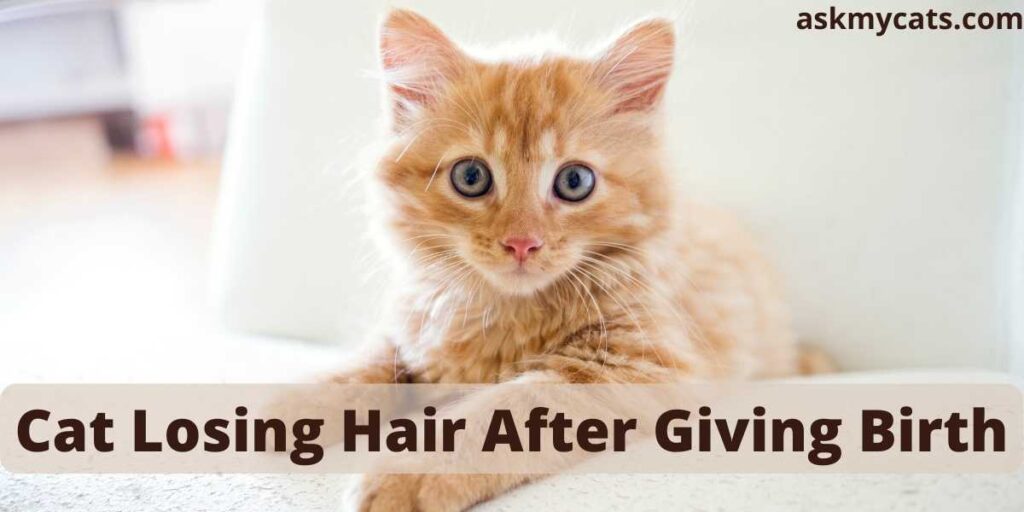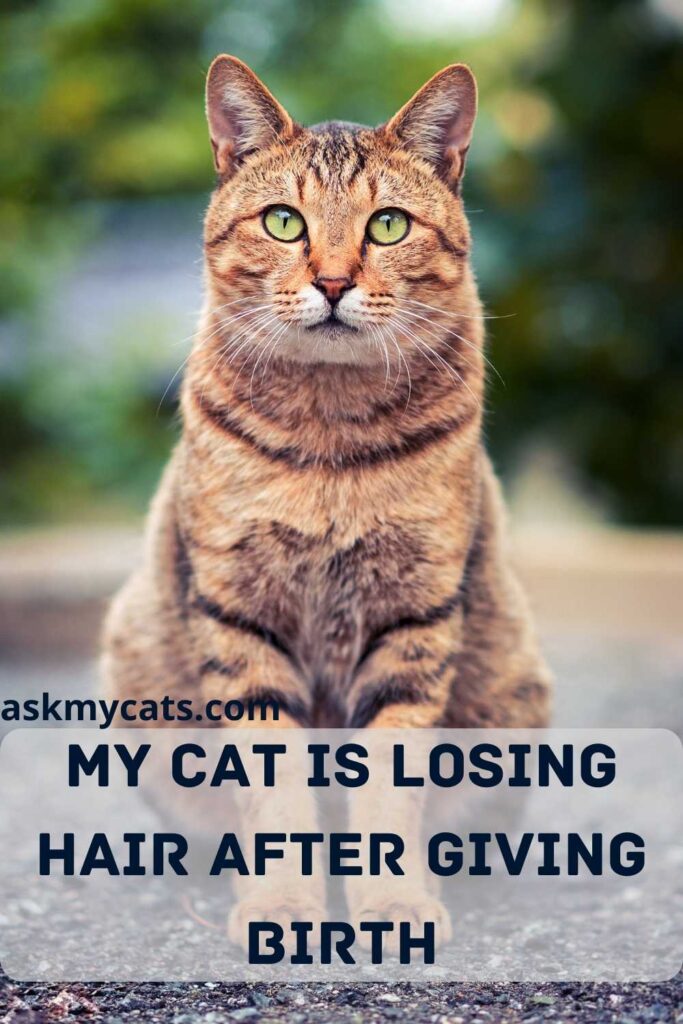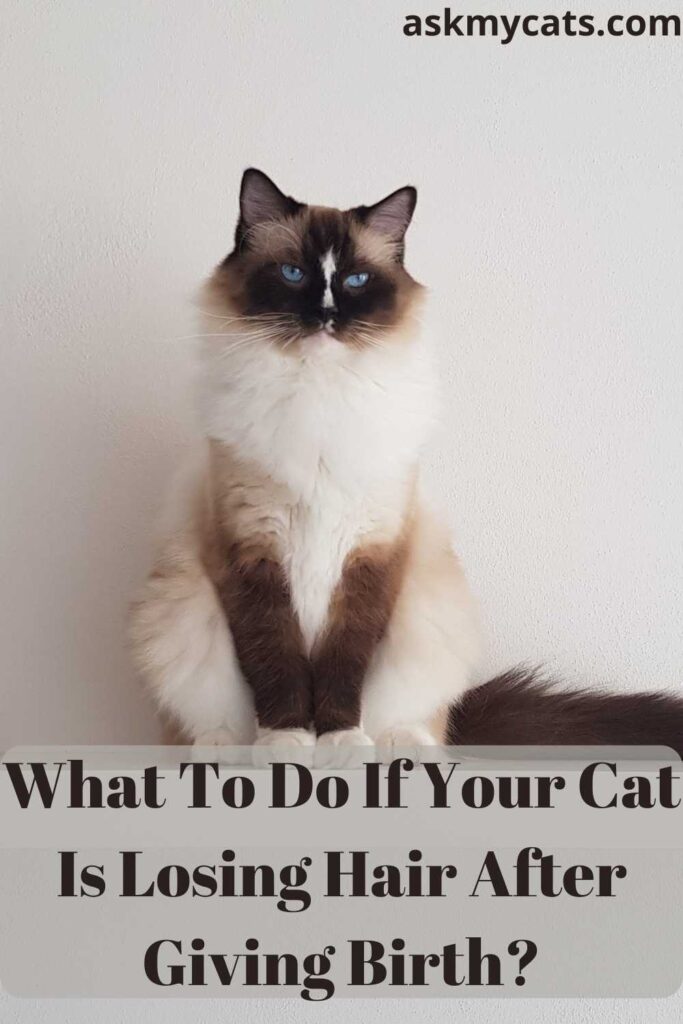If you observe your cat losing hair, you must assess whether the loss is normal or atypical. Cats can lose their hair for a variety of causes.
Normal hair loss includes shedding, for example. Hair loss that is not caused by natural shedding is considered abnormal and should be investigated.
So, is a cat losing hair after giving birth normal?
Yes, a cat losing hair after giving birth is normal, however, if it persists for longer a vet intervention is needed.
Keep reading this article to know more about why your cat is losing hair after birth.


Give Your Cat the Perfect Day
Get the Free Ebook!
Why Is My Cat Losing Hair After Giving Birth?
Here are some reasons why your cat might be losing here after giving birth: –

1. Allergies (Dermatitis)
Dermatitis is a type of skin inflammation. Allergies, such as flea allergies, food allergies, environmental allergies, or contact allergies, are common causes of dermatitis.
Skin allergies cause the cat to scratch, lick, or chew on her skin, resulting in sores, lumps, crusting, scabbing, redness, and hair loss.
A cat’s entire belly might grow bald at times.
2. Fleas And Other Parasites
Mother cats with parasites that dwell on the skin, such as fleas, ticks, or mites, may experience hair loss as a result of scratching and biting their sensitive and irritated skin.
In cats, flea bites can even induce allergic reactions, resulting in severe skin irritation and hair loss.
3. Hormonal Issues
Hair loss can be caused by hormonal imbalances such as Cushing’s illness (excess cortisol levels) and hyperthyroidism (overactive thyroid).
Due to hormonal imbalance, female cats may lose a significant amount of coat after giving birth or nursing their kittens.
4. Ringworm
A ringworm is a fungal infection rather than a worm. Ringworm can cause hair loss in addition to skin lesions.
A circular lesion on the skin in the shape of a ring is a telltale indication of ringworm. Ringworm is extremely contagious, not only to cats but also to dogs and humans.
5. Skin Infection
Bacterial, yeast, or fungus skin diseases might cause your mother cat to scratch, lick, or bite at the skin.
6. Mange
Mange is caused by an overgrowth of mites residing on the skin and is much less common in cats than in dogs. Mange is characterized by itchy skin and patchy hair loss.
7. Over-Grooming
Some cats over-groom themselves, causing hair loss. Hair loss due to over-grooming is sometimes caused by stress or anxiety, known as psychogenic alopecia.
Over-grooming can also occur when the cat is experiencing itchy skin.
You might also like to read Why Is My Pregnant Cat Losing Hair?
What To Do If Your Cat Is Losing Hair After Giving Birth?
The best thing you can do if your cat is losing hair after giving birth is to take her to the vet as soon as possible.

The treatment for your cat’s hair loss after giving birth will be determined by the cause, which veterinary staff can identify.
Because many of the causes do not share similar treatment approaches, therapy strategies will differ greatly.
The success of treatments will be heavily reliant on a precise diagnosis of the cause of the alopecia.
There is no treatment available in some cases, such as those involving congenital or hereditary hair loss. Among the most prevalent therapies are:
1. Topical Treatments
When treating alopecia, a topical cream is frequently utilized.
In some circumstances, a topical cream may be used to treat the underlying cause of hair loss, but it is also usual to use one to treat symptoms such as skin irritation.
This is a common option when hair loss is caused by fleas or related disorders, fungal infections, certain skin ailments, or skin injuries.
2. Antidepressants or Antianxiety Medications
Medication may be provided to assist the cat to cope with psychogenic alopecia, or hair loss induced by mental problems such as stress.
In many cases, this approach has been effective in reducing excessive grooming while taking the medicine.
The drug used in this treatment may cause some adverse effects, but they are usually minor. This sort of therapy is frequently utilized in conjunction with behavior modification and the reduction of environmental stressors.
3. Antihistamines
When an allergic reaction causes skin irritation and hair loss, this class of medication is used to lessen the body’s response to the allergen.
Even if an allergic reaction has not been discovered, this medication is considered low risk and may be used with other medicines used to treat alopecia.
4. Cause-Specific Treatments
A variety of additional therapies may be utilized to treat the underlying issue that has caused your cat’s hair loss after giving birth.
Speak with your veterinarian about how therapies for infections, tumors, imbalances, and other disorders may affect your cat, as well as the dangers involved with the prescribed therapy.
Check out more reasons for Cat Shedding Fur In Clumps
How To Diagnose Hair Loss In Cats?
Due to the sheer multiple potential causes of alopecia, determining the reason may necessitate thorough diagnostic testing.
Prepare to talk about your cat’s medical history, any drugs or poisons they may have consumed, and any symptoms you’ve noticed. Your veterinarian will do a thorough physical examination, paying specific attention to hot spots and skin conditions.
For analysis, a smear, culture, or biopsy of the afflicted area may be required. Combing the hair to find lice, mites, or fleas and microscopic inspection of the hair may provide information on the reason.
Veterinary personnel may also sample blood and perform a comprehensive blood panel as well as a variety of tests for common infections.
Analysis of urine, feces, or any fluids may also be required. X-rays or other diagnostic imaging techniques may be employed to look for internal causes like cancer.
How Fast Do Cats Recover From Hair Loss After Giving Birth?
The likelihood of recovery from alopecia is determined by the source of the hair loss. Hair loss can be permanent in both entire and partial occurrences, especially when follicular issues are the reason.
If the loss was caused by infections or other treatable disorders, the prognosis is usually good if the cause is treated.
Continue to monitor your pet’s condition, follow all of your veterinarian’s recommendations, finish the entire course of drugs, and return for further medical attention if the situation worsens.
Reducing stress in your cat’s environment and offering them a nutritious diet will help them recuperate. Avoid making any substantial alterations until your cat has fully recovered.
Even if your cat’s hair loss is irreversible, he or she can still live a normal life. In these circumstances, special consideration should be given to the temperature of their living environment.
Find out more details about how long does cat hair take to grow back
Frequently Asked Questions
How long does a cat’s pregnancy last?
The pregnancy of a cat lasts about 60 days. The cat will give birth to their kittens when this period has passed. The majority of the time, this occurs at night. The cat seeks out a calm location where it may feel safe, warm, and at ease. They will almost always give birth on their own, preferring the privacy of seclusion. While you may be able to see them from afar, you should avoid interacting with them if at all possible. It’s common for a cat to cease eating before giving birth. There are different complications that may occur during a cat’s delivery. This may have to do with both physical problems as well as mental stress if the cat is not in a good position to deliver the kittens.
Final Words
If your cat’s hair loss persists for a long duration, you should take her to the clinic right once. The sooner therapy may begin, the faster your cat will be able to recover and nurse and care for infants.
Ask us questions in the comments section if you have any.
Interesting Read: Do Black Cats Shed?
